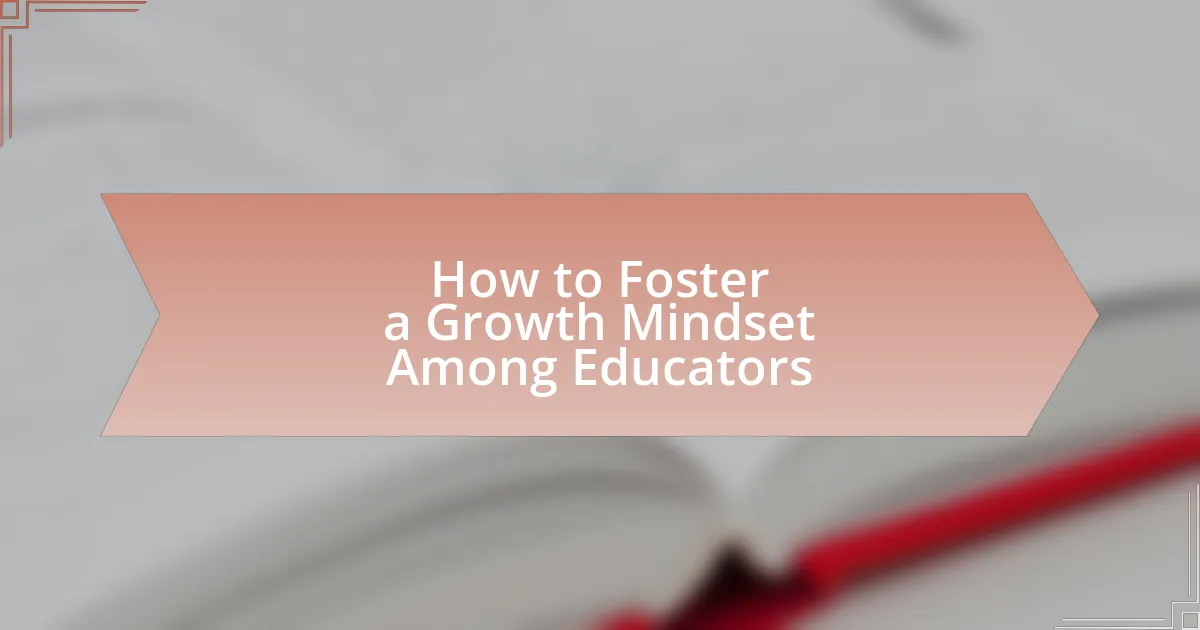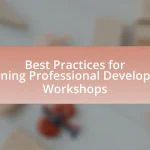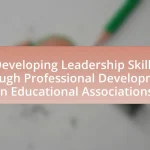The article focuses on fostering a growth mindset among educators, emphasizing the belief that abilities and intelligence can be developed through effort and learning. It outlines the differences between growth and fixed mindsets, highlighting the importance of resilience, feedback, and continuous improvement in teaching practices. Key principles for cultivating a growth mindset include embracing challenges, valuing effort, and learning from criticism. The article also discusses effective strategies for educators to model this mindset for their students, create supportive learning environments, and utilize constructive feedback to enhance both teaching and learning outcomes.
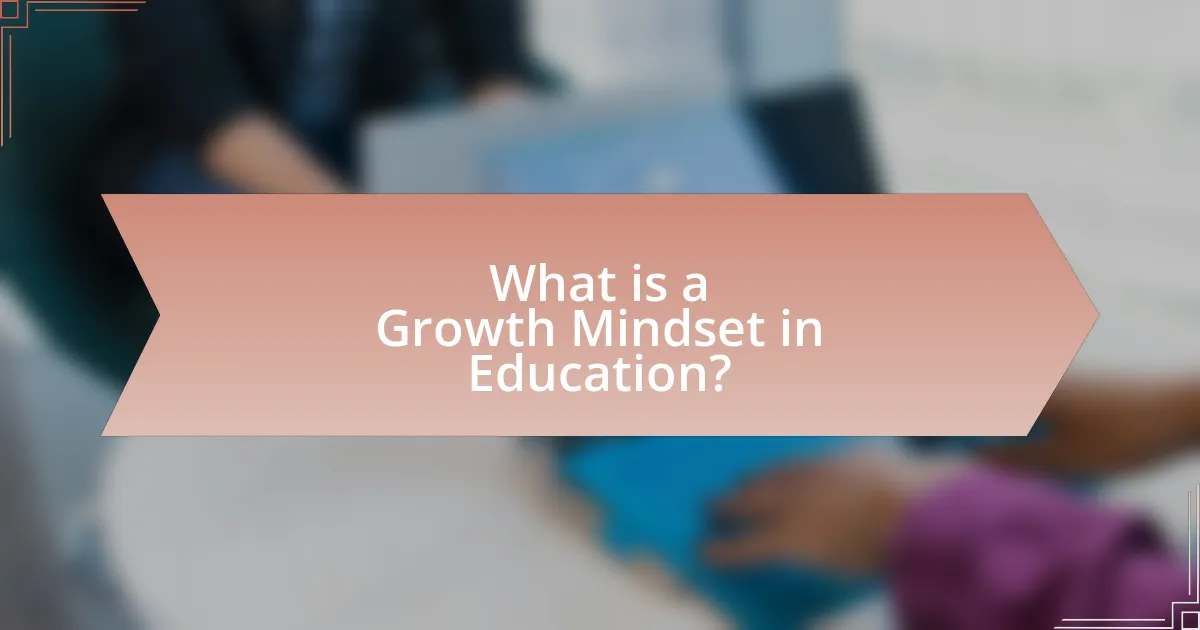
What is a Growth Mindset in Education?
A growth mindset in education is the belief that students can develop their abilities and intelligence through effort, learning, and persistence. This concept, popularized by psychologist Carol Dweck, emphasizes that challenges and failures are opportunities for growth rather than indicators of fixed ability. Research shows that students with a growth mindset are more likely to embrace challenges, persist in the face of setbacks, and achieve higher academic outcomes. For instance, a study published in the journal “Psychological Science” found that students who were taught about growth mindset principles improved their math scores significantly compared to those who were not.
How does a growth mindset differ from a fixed mindset?
A growth mindset differs from a fixed mindset in that individuals with a growth mindset believe their abilities and intelligence can be developed through effort and learning, while those with a fixed mindset believe their abilities are static and unchangeable. Research by psychologist Carol Dweck indicates that individuals with a growth mindset are more likely to embrace challenges, persist through difficulties, and view failures as opportunities for growth, whereas those with a fixed mindset may avoid challenges and feel threatened by the success of others. This distinction is crucial in educational settings, as fostering a growth mindset can lead to improved student engagement and achievement.
What are the characteristics of a growth mindset in educators?
A growth mindset in educators is characterized by a belief in the ability to develop skills and intelligence through effort and learning. Educators with a growth mindset embrace challenges, view failures as opportunities for growth, and persist in the face of setbacks. They actively seek feedback to improve their teaching practices and encourage a culture of learning among their students. Research by Carol Dweck, a leading psychologist in this field, highlights that individuals with a growth mindset are more likely to achieve higher levels of success because they are open to learning and adapting.
Why is a growth mindset important for teaching and learning?
A growth mindset is important for teaching and learning because it encourages resilience and a love for learning among students. When educators model a growth mindset, they demonstrate that abilities can be developed through dedication and hard work, which fosters a positive learning environment. Research by Carol Dweck, a leading psychologist in this field, shows that students with a growth mindset are more likely to embrace challenges, persist through difficulties, and achieve higher academic performance. This mindset shift not only enhances student engagement but also promotes a culture of continuous improvement within educational settings.
What are the key principles of fostering a growth mindset?
The key principles of fostering a growth mindset include embracing challenges, persisting through difficulties, valuing effort, learning from criticism, and finding inspiration in others’ success. Embracing challenges encourages individuals to step out of their comfort zones, which is essential for growth. Persisting through difficulties reinforces resilience, allowing individuals to overcome obstacles. Valuing effort highlights the importance of hard work and dedication in achieving success, rather than relying solely on innate talent. Learning from criticism provides constructive feedback that can lead to improvement and development. Finally, finding inspiration in others’ success fosters a collaborative environment where individuals can learn from each other’s experiences. These principles are supported by research from Carol Dweck, who emphasizes that a growth mindset can significantly enhance learning and achievement.
How can educators model a growth mindset for their students?
Educators can model a growth mindset for their students by demonstrating resilience and a willingness to learn from mistakes. When educators openly share their challenges and the strategies they use to overcome them, they illustrate that effort and persistence lead to improvement. Research by Carol Dweck, a leading psychologist in the field, emphasizes that teaching students about the brain’s ability to grow and adapt can significantly influence their attitudes toward learning. By praising effort rather than innate ability, educators reinforce the idea that skills can be developed through dedication and hard work. This approach not only fosters a growth mindset in students but also creates a classroom culture where challenges are viewed as opportunities for growth.
What role does feedback play in developing a growth mindset?
Feedback is essential in developing a growth mindset as it provides individuals with specific information about their performance, guiding them toward improvement. When educators receive constructive feedback, they can identify areas for growth, which fosters resilience and a willingness to learn from mistakes. Research by Dweck (2006) indicates that feedback emphasizing effort and strategies rather than inherent ability encourages a belief in the potential for development, reinforcing the principles of a growth mindset. This process not only enhances learning outcomes but also cultivates a culture of continuous improvement among educators.
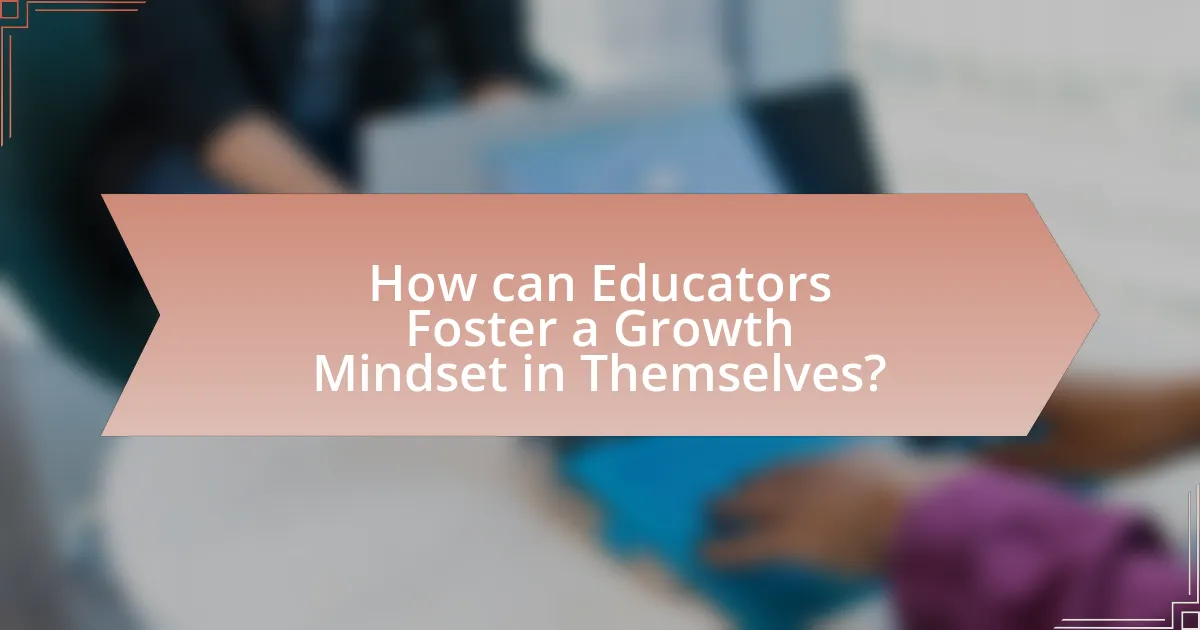
How can Educators Foster a Growth Mindset in Themselves?
Educators can foster a growth mindset in themselves by actively seeking challenges, embracing feedback, and reflecting on their teaching practices. Engaging in professional development opportunities, such as workshops and collaborative learning communities, allows educators to expand their skills and adapt to new teaching methods. Research by Dweck (2006) emphasizes that individuals who view challenges as opportunities for growth are more likely to develop resilience and improve their abilities. Additionally, educators can model a growth mindset for their students by sharing their own learning experiences and demonstrating that effort leads to improvement. This approach not only enhances their own mindset but also creates a supportive learning environment for students.
What strategies can educators use to cultivate their own growth mindset?
Educators can cultivate their own growth mindset by engaging in continuous professional development and reflecting on their teaching practices. Continuous professional development allows educators to learn new strategies and approaches, which fosters adaptability and resilience. For instance, participating in workshops or online courses can expose educators to innovative teaching methods, reinforcing the belief that skills can be developed over time. Additionally, regular reflection on their teaching experiences helps educators identify areas for improvement and recognize their progress, which is essential for maintaining a growth mindset. Research by Dweck (2006) emphasizes that individuals who embrace challenges and learn from feedback are more likely to develop a growth mindset, supporting the effectiveness of these strategies.
How can self-reflection enhance an educator’s growth mindset?
Self-reflection enhances an educator’s growth mindset by allowing them to critically evaluate their teaching practices and identify areas for improvement. This process encourages educators to recognize their strengths and weaknesses, fostering a belief in their ability to develop and adapt. Research indicates that self-reflection leads to increased self-awareness, which is essential for cultivating a growth mindset, as it helps educators understand that challenges are opportunities for learning rather than obstacles. Studies show that educators who engage in regular self-reflection are more likely to embrace feedback and persist in the face of difficulties, reinforcing their commitment to professional growth and development.
What resources are available for educators to develop a growth mindset?
Educators can access various resources to develop a growth mindset, including books, online courses, and workshops. Notable books such as “Mindset: The New Psychology of Success” by Carol S. Dweck provide foundational knowledge on growth mindset principles. Online platforms like Coursera and edX offer courses specifically designed for educators to learn about fostering growth mindsets in themselves and their students. Additionally, organizations like the Mindset Works provide workshops and training programs tailored for educators, emphasizing practical strategies to implement growth mindset concepts in the classroom. These resources are validated by research indicating that a growth mindset can enhance teaching effectiveness and student outcomes.
How can collaboration among educators support a growth mindset?
Collaboration among educators can significantly support a growth mindset by fostering an environment of shared learning and mutual support. When educators collaborate, they exchange ideas, strategies, and feedback, which enhances their professional development and encourages a culture of continuous improvement. Research indicates that collaborative practices, such as co-teaching and peer observations, lead to increased efficacy and adaptability among educators, which are key components of a growth mindset. For instance, a study by Vescio, Ross, and Adams (2008) published in “Teaching and Teacher Education” found that collaborative professional development positively impacts teachers’ beliefs about their abilities and their students’ potential, reinforcing the principles of a growth mindset.
What are the benefits of peer feedback in fostering a growth mindset?
Peer feedback significantly enhances the development of a growth mindset by promoting a culture of collaboration and continuous improvement. This process allows educators to receive constructive criticism and diverse perspectives, which can challenge their existing beliefs and encourage them to embrace learning opportunities. Research indicates that peer feedback fosters resilience and adaptability, essential components of a growth mindset, as it helps individuals view challenges as opportunities for growth rather than obstacles. Furthermore, studies show that environments where peer feedback is encouraged lead to increased motivation and engagement, reinforcing the idea that abilities can be developed through effort and learning.
How can professional development programs promote a growth mindset culture?
Professional development programs can promote a growth mindset culture by incorporating training that emphasizes the value of learning from failures and encourages continuous improvement. These programs can provide educators with strategies to foster resilience and adaptability in their teaching practices, which are key components of a growth mindset. Research indicates that when educators engage in collaborative learning environments, they are more likely to adopt a growth mindset, as they share experiences and learn from one another. For instance, a study by Dweck (2006) highlights that educators who embrace challenges and view effort as a pathway to mastery can significantly influence their students’ attitudes towards learning. Thus, professional development programs that focus on these principles can effectively cultivate a growth mindset culture among educators.
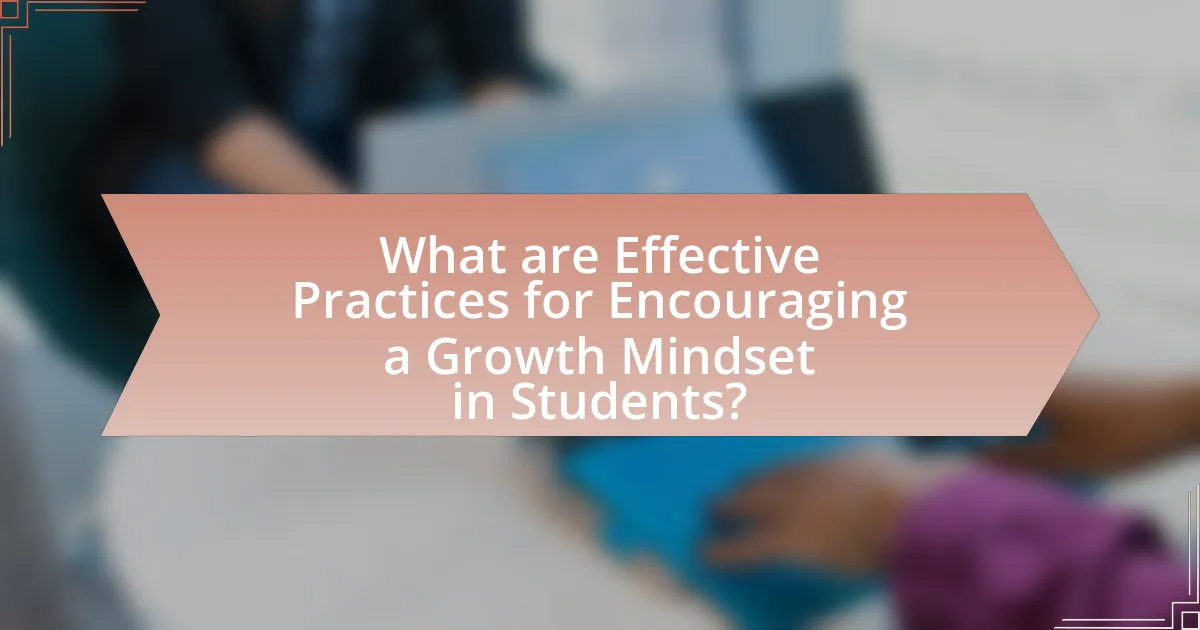
What are Effective Practices for Encouraging a Growth Mindset in Students?
Effective practices for encouraging a growth mindset in students include promoting effort over innate ability, providing constructive feedback, and fostering a safe learning environment. Research indicates that when educators emphasize the importance of effort, students are more likely to embrace challenges and persist through difficulties. For instance, a study by Dweck (2006) found that students who received praise for their effort rather than their intelligence were more resilient and willing to tackle difficult tasks. Additionally, constructive feedback helps students understand their progress and areas for improvement, reinforcing the idea that abilities can be developed. Creating a safe learning environment where mistakes are viewed as learning opportunities further supports the growth mindset, allowing students to take risks without fear of failure.
How can educators create a classroom environment that supports a growth mindset?
Educators can create a classroom environment that supports a growth mindset by promoting a culture of learning through constructive feedback, encouraging risk-taking, and modeling resilience. Constructive feedback helps students understand that effort leads to improvement, while risk-taking fosters an atmosphere where mistakes are viewed as learning opportunities. Research by Dweck (2006) emphasizes that praising effort rather than innate ability reinforces the belief that skills can be developed. Additionally, educators can implement collaborative learning activities that emphasize teamwork and shared problem-solving, further enhancing students’ belief in their capacity to grow and learn.
What types of activities can promote a growth mindset among students?
Activities that can promote a growth mindset among students include collaborative problem-solving tasks, reflective journaling, and embracing challenges through project-based learning. Collaborative problem-solving tasks encourage students to work together, share diverse perspectives, and learn from each other’s mistakes, reinforcing the idea that effort and collaboration lead to improvement. Reflective journaling allows students to track their progress, recognize their learning journey, and understand that setbacks are part of growth. Project-based learning engages students in real-world challenges, fostering resilience and adaptability, which are key components of a growth mindset. Research by Dweck (2006) highlights that students who engage in these types of activities are more likely to develop a belief in their ability to grow and succeed through effort and perseverance.
How can educators address challenges students face in developing a growth mindset?
Educators can address challenges students face in developing a growth mindset by implementing targeted strategies such as fostering a supportive learning environment, providing constructive feedback, and modeling resilience. Creating a classroom atmosphere that encourages risk-taking and values effort over innate ability helps students feel safe to embrace challenges. Research indicates that when educators give specific, actionable feedback rather than general praise, students are more likely to understand their progress and areas for improvement, which reinforces a growth mindset. Additionally, educators can share their own experiences of overcoming obstacles, demonstrating that effort and persistence lead to success, thereby normalizing the struggle inherent in learning.
What role does assessment play in fostering a growth mindset?
Assessment plays a crucial role in fostering a growth mindset by providing feedback that emphasizes effort and improvement rather than innate ability. This feedback helps learners understand that their skills can develop over time through dedication and hard work. Research by Dweck (2006) indicates that when assessments focus on progress and learning goals, they encourage students to embrace challenges and persist in the face of setbacks, reinforcing the belief that abilities can be cultivated. Thus, effective assessment practices are essential in promoting a growth mindset among educators and students alike.
How can formative assessments encourage a growth mindset in students?
Formative assessments can encourage a growth mindset in students by providing ongoing feedback that emphasizes improvement and learning over time. These assessments allow students to understand their current abilities, identify areas for growth, and recognize that effort leads to mastery. Research shows that when students receive constructive feedback through formative assessments, they are more likely to view challenges as opportunities for development rather than as threats to their intelligence. For instance, a study by Black and Wiliam (1998) found that formative assessment practices significantly enhance student achievement by fostering a belief in the potential for growth. This evidence supports the idea that formative assessments play a crucial role in cultivating a growth mindset among students.
What are the best practices for providing constructive feedback?
The best practices for providing constructive feedback include being specific, focusing on behavior rather than personal attributes, and ensuring the feedback is timely. Specific feedback helps the recipient understand exactly what actions to change, while focusing on behavior maintains a positive relationship and encourages growth. Timeliness ensures that the feedback is relevant and can be acted upon immediately. Research by Stone and Heen in “Thanks for the Feedback” emphasizes that effective feedback should also include a balance of positive reinforcement and areas for improvement, which fosters a growth mindset among educators.
What are some common obstacles to fostering a growth mindset?
Common obstacles to fostering a growth mindset include fixed beliefs about intelligence, fear of failure, and lack of supportive environments. Fixed beliefs about intelligence can hinder individuals from embracing challenges, as they may view their abilities as static rather than improvable. Fear of failure often leads to avoidance of risks, preventing educators from trying new teaching methods or strategies. Additionally, a lack of supportive environments, such as insufficient encouragement from peers or administration, can stifle the development of a growth mindset, as individuals may feel isolated in their efforts to change.
How can educators overcome resistance to change in mindset?
Educators can overcome resistance to change in mindset by implementing targeted professional development programs that emphasize the benefits of a growth mindset. Research indicates that structured training can significantly alter educators’ perceptions and practices, as shown in a study by Dweck (2006), which highlights that individuals exposed to growth mindset principles demonstrate increased resilience and adaptability. By fostering an environment that encourages experimentation and reflection, educators can gradually shift their mindset, leading to improved teaching strategies and student outcomes.
What strategies can help educators deal with setbacks in promoting a growth mindset?
Educators can effectively deal with setbacks in promoting a growth mindset by implementing reflective practices, fostering a supportive community, and utilizing feedback mechanisms. Reflective practices allow educators to analyze their experiences and identify areas for improvement, which is essential for personal growth. A supportive community encourages collaboration and sharing of challenges, enabling educators to learn from one another’s experiences. Utilizing feedback mechanisms, such as surveys or discussions, helps educators understand the impact of their strategies and adjust accordingly. Research indicates that these approaches can enhance resilience and adaptability, crucial traits for overcoming setbacks in educational settings.
What are the best practices for implementing a growth mindset in education?
The best practices for implementing a growth mindset in education include fostering a culture of feedback, encouraging risk-taking, and modeling resilience. Educators should provide constructive feedback that emphasizes effort and improvement rather than innate ability, as research shows that feedback focused on growth can enhance student motivation and achievement (Hattie & Timperley, 2007). Additionally, creating an environment where students feel safe to take risks and learn from mistakes promotes a growth mindset, as it allows them to view challenges as opportunities for development. Finally, educators must model resilience by sharing their own learning experiences and demonstrating how to overcome obstacles, which reinforces the idea that effort leads to growth.
